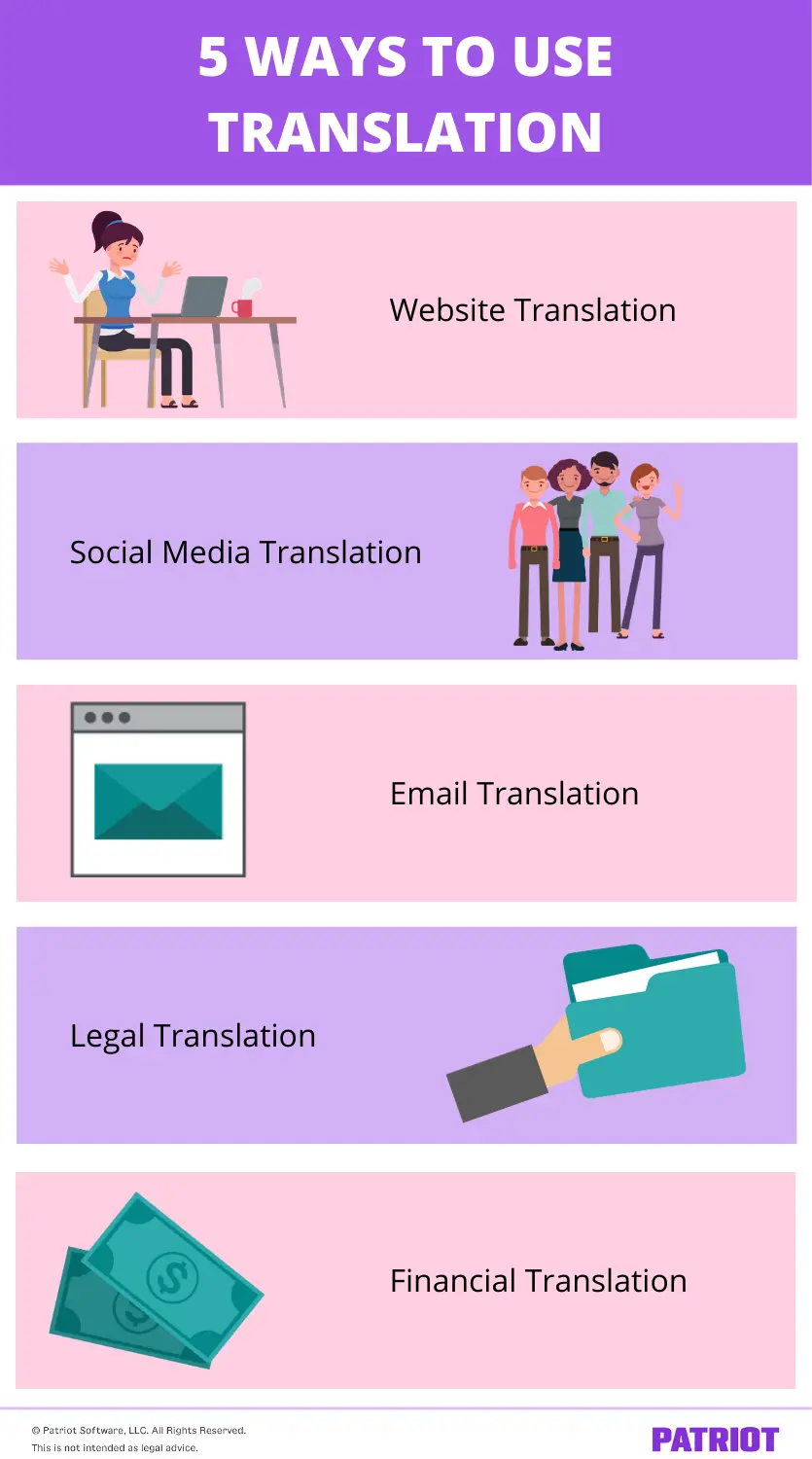If you run a small business, you no doubt appreciate how challenging it can be to control costs. But despite the cashflow headaches that running a small business can sometimes create, doing so also provides a wealth of opportunities that larger companies usually don’t offer.
Implementing new projects, for example, can be fast and efficient when there aren’t multiple layers of bureaucracy to negotiate. Undertaking a translation project is just such as task—and one that can have a number of benefits and is in fact on the rise with businesses throughout the world.
Types of translation projects
Here are a few types of translation projects you can undertake.

1. Website translation for small businesses
No matter how small your business may be, you could well benefit from having your website translated into other languages. Undertaking website translation can broaden your customer base and connect your brand with new audiences.
You may need to do a little extra legwork to accurately translate. If you’re serious about connecting with audiences, be sure to undertake website localization as well as translation. The localization element is what will ensure that your company resonates perfectly with potential new customers, with no clumsy gaffes.
Most professional translation agencies offer localization services, so finding a localization expert for your website translation project shouldn’t be difficult.
2. Using social media translation to your advantage
Small businesses are the backbone of every major economy. In the U.S., the Small Business and Entrepreneurship Council reports that firms with fewer than 100 workers make up 98.2% of all employers, while firms with under 20 workers account for 89.0%.
Thankfully, the power of social media means that even the tiniest of businesses can connect with customers —and potential new customers—from anywhere. And, translation is a powerful tool to help with this.
Using a translation service for your social media posts isn’t just about connecting with customers in other countries, though it can, of course, help to do this. Translation can also help companies connect with those who speak various languages within their own country.
Failing to translate your social media posts into another language may result in you missing out on reaching a potential pool of your target audience.
Again, localization is important here. The famous American ‘Got milk?’ advertising campaign that began in California back in 1993 and was so successful for the state’s dairy industry never translated well to Spanish-speaking communities due to a lack of localization. The translation came across as ‘Are you lactating?’ which, unsurprisingly, did little to boost sales of cow’s milk.
3. Building staff loyalty through email translation
It’s not just external contacts that companies can impress with their translation efforts. We live in a world where technology has enabled global telecommuting. As such, it’s not uncommon for a company to engage workers in multiple locations.
While it’s reasonable for a small business to expect that any freelancers they hire will be able to speak the same language as the business owner sufficiently to work together, that doesn’t mean that translation can’t help to build up long-term loyalty. A quick translation of an email wishing a freelancer a happy birthday, or perhaps of praise for a job well done, shows a level of commitment and thought that many freelancers will truly appreciate – and thus makes them more likely to jump at the chance to undertake the next project when it arises. All thanks to a little expenditure with a translation agency.
When you consider the cost of training a new employee or the time investment in finding a good freelancer and bringing them up to speed, the price of a few email translations quickly pales into insignificance.
4. Using legal translation to achieve ultimate peace of mind
Legal translation is another area where the benefits to small businesses can be huge. Small business owners may need to use legal translation services to ensure they enter into appropriate contractual arrangements is essential. For example, small businesses that outsource services such as telephone support to overseas departments may benefit from using legal translation services.
There’s also a compliance element to legal translation. If you sell food products, for example, and wish to export them overseas, you’ll need to understand the legal requirements of the country in question in relation to everything from shelf dates to labeling. A professional legal translator can help you to understand what is required and to ensure that you meet said requirements.
Ultimately, legal translation is about ensuring that everything is done properly, as well as potentially saving money by ensuring that all legal arrangements are as they should be. It is a task that should always be undertaken by translators with specific legal experience, as only someone with detailed knowledge of legal terminology – in both the original and the target language – will suffice for these kinds of translation services.
5. The benefits of financial translation
As well as legal translation, financial translation can bring multiple benefits to small business with big plans. Whether it’s forming a new partnership with a supplier or pitching to angel investors who speak another language, financial translation can help companies to deliver their key information in other languages.
It’s also another area where only a skilled and experienced translation company should be sought to undertake the work, as a mistake in the way that data is presented and explained could have a significant and costly impact, as well as causing reputational damage.
Translation for small businesses—where to start
For small businesses that are about to undertake their first translation project, it’s important to find a company that delivers not just great linguistic services, but also exceptional customer service. It’s also important to provide as much information as possible during the early stage of the project. After all, the more the translator knows about the company in question, the better they can ensure that the translation is in line with the company style. Building glossaries of industry-specific terms and their translations can be a big help with this.
Ultimately, those with the vision and drive to run small businesses have much to benefit from when it comes to using professional translation services. From finding new investors to reaching out to huge new groups of potential customers, translation can lead to big financial rewards. It can also serve to show that the company in question is progressive and inclusive in its approach and that it is savvy enough to conduct itself appropriately.
With so much to be gained, the future looks bright for small businesses that use translation services wisely in order to build their brand, their reputation, and their customer base.
These views are made solely by the author.



